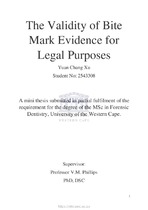| dc.contributor.advisor | Phillips, Vincent | |
| dc.contributor.author | Xu, Yuan Chang | |
| dc.date.accessioned | 2021-04-14T12:19:37Z | |
| dc.date.available | 2021-04-14T12:19:37Z | |
| dc.date.issued | 2021 | |
| dc.identifier.uri | http://hdl.handle.net/11394/8193 | |
| dc.description | Magister Scientiae Dentium - MSc(Dent) | en_US |
| dc.description.abstract | Bite mark evidence has been admitted into US courts since the 1870s. It quickly gained popularity after the conviction of W.E. Marx in 1974 for manslaughter using primarily bite mark evidence. However, since the development of DNA typing and testing in forensic science, the emergence of wrongful convictions has placed the validity of bite mark evidence admissibility into severe dispute. This mini-thesis is a condensation of the past ten years’ worth of literature on the latest researches regarding bite mark evidence. The theory of the uniqueness of the human dentition is analysed. The accurate reproducibility of bite mark on skin with regard to distortion is discussed. Some bite mark court cases, including wrongful convictions are explored. Inconsistent expert opinions and the lack of standards amongst practitioners are also examined. The aim of this study is to summarize the validity of bite mark evidence in the courts of law. | en_US |
| dc.language.iso | en | en_US |
| dc.publisher | University of Western Cape | en_US |
| dc.subject | Evidence | en_US |
| dc.subject | Forensic science | en_US |
| dc.subject | Legality | en_US |
| dc.subject | DNA typing | en_US |
| dc.subject | Wrongful conviction | en_US |
| dc.subject | Criminal liability | en_US |
| dc.subject | Criminal law | en_US |
| dc.title | The validity of bite mark evidence for legal purposes | en_US |
| dc.rights.holder | University of Western Cape | en_US |

